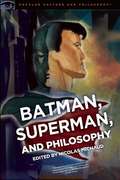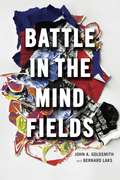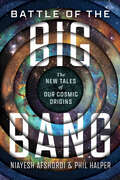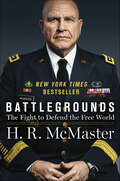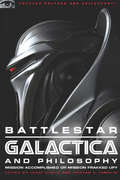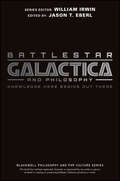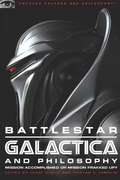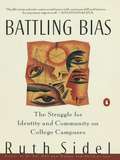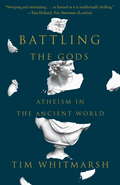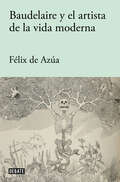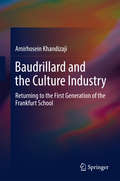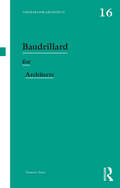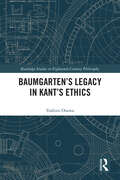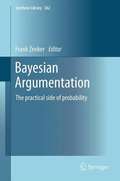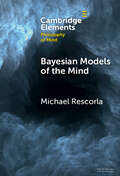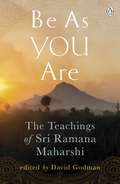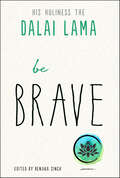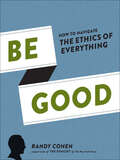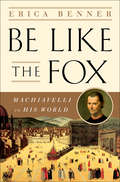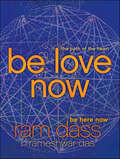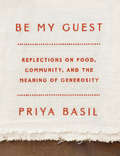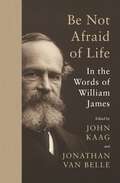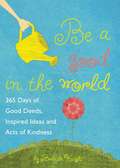- Table View
- List View
Batman, Superman, and Philosophy (Popular Culture and Philosophy #Vol. 100)
by Nicolas MichaudBatman or Superman? Which of these heroic figures is morally superior? Which is more dramatically effective? Which is more democratic? Which shows us the better way to fight crime? Who is a morally better person? Whose actions lead to the better outcomes? Superman vs. Batman and Philosophy tries to decide "for" and "against" these two superheroes by comparing their contrasting approaches to a wide range of issues. Twenty-six philosophers evaluate Superman vs. Batman in order to decide which of them "wins" by various different criteria. Some of the writers say that Superman wins, others say Batman, and others give the result as a tie.Since both Batman, the megalomaniacal industrialist, and Superman, the darling of the media, sometimes operate outside the law, which of them makes the better vigilante--and how do they compare with Robin Hood, the anonymous donor, the Ninja, and the KKK? Which of them comes out better in terms of evolutionary biology? Which of the heroes works more effectively to resist oppression? Does Superman or Batman function better as a force for embodied intelligence? Who does more to really uphold the law? Which one is better for the environment? Which of these two supernormal guys makes a better model and inspiring myth to define our culture and our society? Is Batman or Superman the more admirable person? Who conforms more closely to Nietzsche's Übermensch? Which one makes the more rational choices? Who makes the better god? Who is more self-sacrificing in pursuit of other people's welfare? Who goes beyond the call of duty? Which one does better at defining himself by resolving his internal conflicts? Whose explicit code of morality is superior? Which superhero gives us more satisfying dramatic conflict? (And why does a battle between the two make such a compelling drama?)Which of our two candidates comes closer to Christ? Which has the sounder psychological health? Whose overall consequences are better for the world? Which one more perfectly exemplifies C.S. Lewis's concept of chivalry? What's the deeper reason Batman is so successful in videogames whereas Superman isn't? What are the advantages and disadvantages of having the two extraordinary heroes work together? Is either superhero logically or metaphysically possible? How can each of them be diagnosed as psychotic? How do they compare in masking their real identity? Whose motives are more worthy? Which one is more self-aware? Superman vs. Batman and Philosophy comes out at the same time as the movie Batman v Superman. The book cannot discuss what goes on in the movie, yet it also can't avoid doing so, since by sheer probability, many of the controversial issues between the two superheroes will be the same in both. The book will therefore naturally fit in with the numerous raging controversies that the movie unleashes.
Battle in the Mind Fields
by John A. Goldsmith Bernard Laks“We frequently see one idea appear in one discipline as if it were new, when it migrated from another discipline, like a mole that had dug under a fence and popped up on the other side.” Taking note of this phenomenon, John Goldsmith and Bernard Laks embark on a uniquely interdisciplinary history of the genesis of linguistics, from nineteenth-century currents of thought in the mind sciences through to the origins of structuralism and the ruptures, both political and intellectual, in the years leading up to World War II. Seeking to explain where contemporary ideas in linguistics come from and how they have been justified, Battle in the Mind Fields investigates the porous interplay of concepts between psychology, philosophy, mathematical logic, and linguistics. Goldsmith and Laks trace theories of thought, self-consciousness, and language from the machine age obsession with mind and matter to the development of analytic philosophy, behaviorism, Gestalt psychology, positivism, and structural linguistics, emphasizing throughout the synthesis and continuity that has brought about progress in our understanding of the human mind. Arguing that it is impossible to understand the history of any of these fields in isolation, Goldsmith and Laks suggest that the ruptures between them arose chiefly from social and institutional circumstances rather than a fundamental disparity of ideas.
Battle of the Big Bang: The New Tales of Our Cosmic Origins
by Niayesh Afshordi Phil HalperA thrilling exploration of competing cosmological origin stories, comparing new scientific ideas that upend our very notions of space, time, and reality. By most popular accounts, the universe started with a bang some 13.8 billion years ago. But what happened before the Big Bang? And how do we know it happened at all? Here prominent cosmologist Niayesh Afshordi and science communicator Phil Halper offer a tour of the peculiar possibilities: bouncing and cyclic universes, time loops, creations from nothing, multiverses, black hole births, string theories, and holograms. Along the way, they offer both a call for new physics and a riveting story of scientific debate. Incorporating insights from Afshordi’s cutting-edge research and Halper’s original interviews with scientists like Stephen Hawking, Roger Penrose, and Alan Guth, Battle of the Big Bang compares these models for the origin of our origins, showing each theory’s strengths and weaknesses and explaining new attempts to test these notions. Battle of the Big Bang is a tale of rivalries and intrigue, of clashes of ideas that have raged from Greek antiquity to the present day over whether the universe is eternal or had a beginning, whether it is unique or one of many. But most of all, Afshordi and Halper show that this search is filled with wonder, discovery, and community—all essential for remembering a forgotten cosmic past.
Battlegrounds: The Fight to Defend the Free World
by H. R. McMasterThe former National Security Advisor's New York Times bestselling critique of US foreign policy—with new material on the Jan. 6th assault on the Capitol. In Battlegrounds, Lt. General H.R. McMaster, U.S. Army, ret., the former National Security Advisor under President Trump, delivers a bold re-examination of the most critical foreign policy and national security challenges facing the United States. In this new edition, McMaster addresses the January 2021 assault on the U.S. Capitol and discusses how citizens across the free world can work together to restore confidence in democratic institutions.According to McMaster, American foreign policy has been misconceived and poorly implemented since the end of the Cold War. This has allowed threats to security, freedom, and prosperity—such as nuclear proliferation and jihadist terrorism—to grow. As National Security Advisor, he pursued course correction through a fundamental shift in policy. Now he provides a clear path to improving strategic competence and prevailing in complex competitions against our adversaries.Calling on all Americans to rise above the vitriol of partisan discourse, McMaster stresses the importance of educating ourselves about the national and international security challenges we face. Only then can we work together to secure peace and prosperity for future generations.
Battlestar Galactica and Philosophy
by Tristan D. Tamplin Josef SteiffIn attempting to retain her "human" side, does Sharon really have free will? Is killing a Cylon murder or garbage disposal? These are some of the questions addressed in this thoughtful collection of writings on the philosophical underpinnings of Battlestar, Galactica. The book includes a brief analysis of the original 1970s and 80s series but concentrates primarily on the episodes, characters, and issues from the entirely reimagined current series (including its fourth and final season, scheduled for airing in early 2008) as well as the two-hour TV movie and direct-to-DVD release Razor.
Battlestar Galactica and Philosophy: Knowledge Here Begins Out There
by Jason T. EberlThis thought-provoking book examines the philosophical issues arising from the re-imagined Battlestar Galacticatelevision series, revealing how the ragtag fleet's outward journey to Earth is also an inward exploration for the human survivors and their Cylon pursuers.
Battlestar Galactica and Philosophy: Mission Accomplished or Mission Frakked Up?
by Tristan D. Tamplin Josef SteiffIn this book for students in pop culture and philosophy, Steiff (film and video, Columbia College, Chicago) and Tamplin (philosophy) present 33 essays from scholars in philosophy, media studies, screenwriting, and military intelligence, among other fields, dissecting the science fiction TV series Battlestar Galactica and its movie spin-offs in terms of the philosophical questions they confront. The contributors demonstrate how the show tackles such issues as who counts as human, the implications of the killing of an intelligent non-human, democracy and bad decisions, occupation or resistance in war, the balancing of security and democracy, free will and determinism, and colonialism, among others.
Battling Bias
by Ruth SidelPoliticians, philosophers, and academics have spent countless hours debating the issues of greatest concern on college campuses today: multiculturalism, political correctness, race relations, sexual politics, and gender. But what has been noticeably missing from their discussions are the voices of the students themselves. Battling Bias is one of the first books to offer an analysis of their actions and reactions on their own college campuses. In this work a wide variety of students from both public and private schools across the country share their pain and anger, their concerns and experiences and the impact on their lives of the surge of conflicts so omnipresent on campuses today. Sidel explores these issues against a backdrop of our current economic problems and polarities, our increasingly diverse society and changing patterns of immigration. She discusses the key problems for American higher education (including who should have access to it), and offers solutions. This unique contribution to the continuing debate on the role of education in a democratic society should be required reading for anyone interested in the future of our schools and of our nation. .
Battling Bias
by Ruth SidelPoliticians, philosophers, and academics have spent countless hours debating the issues of greatest concern on college campuses today: multiculturalism, political correctness, race relations, sexual politics, and gender. But what has been noticeably missing from their discussions are the voices of the students themselves. Battling Bias is one of the first books to offer an analysis of their actions and reactions on their own college campuses. In this work a wide variety of students from both public and private schools across the country share their pain and anger, their concerns and experiences and the impact on their lives of the surge of conflicts so omnipresent on campuses today. Sidel explores these issues against a backdrop of our current economic problems and polarities, our increasingly diverse society and changing patterns of immigration. She discusses the key problems for American higher education (including who should have access to it), and offers solutions. This unique contribution to the continuing debate on the role of education in a democratic society should be required reading for anyone interested in the future of our schools and of our nation.
Battling the Gods
by Tim WhitmarshHow new is atheism? Although adherents and opponents alike today present it as an invention of the European Enlightenment, when the forces of science and secularism broadly challenged those of faith, disbelief in the gods, in fact, originated in a far more remote past. In Battling the Gods, Tim Whitmarsh journeys into the ancient Mediterranean, a world almost unimaginably different from our own, to recover the stories and voices of those who first refused the divinities.Homer's epic poems of human striving, journeying, and passion were ancient Greece's only "sacred texts," but no ancient Greek thought twice about questioning or mocking his stories of the gods. Priests were functionaries rather than sources of moral or cosmological wisdom. The absence of centralized religious authority made for an extraordinary variety of perspectives on sacred matters, from the devotional to the atheos, or "godless." Whitmarsh explores this kaleidoscopic range of ideas about the gods, focusing on the colorful individuals who challenged their existence. Among these were some of the greatest ancient poets and philosophers and writers, as well as the less well known: Diagoras of Melos, perhaps the first self-professed atheist; Democritus, the first materialist; Socrates, executed for rejecting the gods of the Athenian state; Epicurus and his followers, who thought gods could not intervene in human affairs; the brilliantly mischievous satirist Lucian of Samosata.Before the revolutions of late antiquity, which saw the scriptural religions of Christianity and Islam enforced by imperial might, there were few constraints on belief. Everything changed, however, in the millennium between the appearance of the Homeric poems and Christianity's establishment as Rome's state religion in the fourth century AD. As successive Greco-Roman empires grew in size and complexity, and power was increasingly concentrated in central capitals, states sought to impose collective religious adherence, first to cults devoted to individual rulers, and ultimately to monotheism. In this new world, there was no room for outright disbelief: the label "atheist" was used now to demonize anyone who merely disagreed with the orthodoxy--and so it would remain for centuries.As the twenty-first century shapes up into a time of mass information, but also, paradoxically, of collective amnesia concerning the tangled histories of religions, Whitmarsh provides a bracing antidote to our assumptions about the roots of freethinking. By shining a light on atheism's first thousand years, Battling the Gods offers a timely reminder that nonbelief has a wealth of tradition of its own, and, indeed, its own heroes. From the Hardcover edition.
Battling the Gods: Atheism in the Ancient World
by Tim WhitmarshHow new is atheism? Although adherents and opponents alike today present it as an invention of the European Enlightenment, when the forces of science and secularism broadly challenged those of faith, disbelief in the gods, in fact, originated in a far more remote past. In Battling the Gods, Tim Whitmarsh journeys into the ancient Mediterranean, a world almost unimaginably different from our own, to recover the stories and voices of those who first refused the divinities.Homer's epic poems of human striving, journeying, and passion were ancient Greece's only "sacred texts," but no ancient Greek thought twice about questioning or mocking his stories of the gods. Priests were functionaries rather than sources of moral or cosmological wisdom. The absence of centralized religious authority made for an extraordinary variety of perspectives on sacred matters, from the devotional to the atheos, or "godless." Whitmarsh explores this kaleidoscopic range of ideas about the gods, focusing on the colorful individuals who challenged their existence. Among these were some of the greatest ancient poets and philosophers and writers, as well as the less well known: Diagoras of Melos, perhaps the first self-professed atheist; Democritus, the first materialist; Socrates, executed for rejecting the gods of the Athenian state; Epicurus and his followers, who thought gods could not intervene in human affairs; the brilliantly mischievous satirist Lucian of Samosata.Before the revolutions of late antiquity, which saw the scriptural religions of Christianity and Islam enforced by imperial might, there were few constraints on belief. Everything changed, however, in the millennium between the appearance of the Homeric poems and Christianity's establishment as Rome's state religion in the fourth century AD. As successive Greco-Roman empires grew in size and complexity, and power was increasingly concentrated in central capitals, states sought to impose collective religious adherence, first to cults devoted to individual rulers, and ultimately to monotheism. In this new world, there was no room for outright disbelief: the label "atheist" was used now to demonize anyone who merely disagreed with the orthodoxy--and so it would remain for centuries.As the twenty-first century shapes up into a time of mass information, but also, paradoxically, of collective amnesia concerning the tangled histories of religions, Whitmarsh provides a bracing antidote to our assumptions about the roots of freethinking. By shining a light on atheism's first thousand years, Battling the Gods offers a timely reminder that nonbelief has a wealth of tradition of its own, and, indeed, its own heroes. From the Hardcover edition.
Baudelaire y el artista de la vida moderna
by Félix de AzúaUn ensayo sobre la condición del sujeto moderno de la mano de Félix de Azúa, uno de los principales intelectuales de nuestro país. En esta nueva edición, Félix de Azúa regresa a Baudelaire, un autor que ha estudiado durante toda su vida. De hecho, las distintas partes que integran el volumen conforman algo así como los momentos esenciales de su trayectoria intelectual. La sección más antigua, sobre la obra de Baudelaire en general, fue publicada en 1978. Muchos años después, en 1992, Azúa amplió su viejo trabajo con una reflexión sobre la dimensión estética del poeta francés titulada «El artista de la modernidad». Y ahora, el autor completa la secuencia con un texto inédito, «Algunos rasgos del joven Baudelaire», que cierra una meditación de más de cuarenta años sobre la configuración moderna del arte y la literatura, imprescindible para entender el mundo de nuestros días. «En estos últimos tiempos», dice Félix de Azúa en el prólogo, «me ha parecido que volver a Baudelaire era una necesidad, del mismo modo que Hölderlin, desesperado por la sociedad que se le avecinaba a comienzos del siglo XIX, creyó que no había otra tarea significativa más que volver a los griegos y estudiar cómo fue posible tanta grandeza. De manera parecida, quizás también pueda ayudarnos a sobrevivir un regreso a Baudelaire, capaz de sugerirnos algunas indicaciones sobre el mundo que comenzó a crecer a comienzos del siglo XXI, un mundo cada día más incomprensible en el que gobierna la mentira, el engaño, la demagogia y el populismo sobre un panorama en ruinas y unas masas totalmente desnortadas, esclavas de sus aparatos electrónicos.» Con esta nueva edición, al cuidado de Andreu Jaume, el clásico ensayo de Félix de Azúa renueva su vigencia para las próximas generaciones. La crítica ha dicho...«Después de la muerte de Octavio Paz, no creo que haya en nuestra lengua un ensayista más personal, cosmopolita e ilustrado que Félix de Azúa.»Mario Vargas Llosa «Félix de Azúa es la moderación, el equilibrio, la liberalidad, la independencia de juicio, el pensamiento profundo.»Luis María Anson «Félix de Azúa lleva ocupándose desde hace tiempo de una serie de cuestiones y lo ha hecho siempre con una distancia amable, como si anduviera escribiendo siempre con una sonrisa y escapando de la solemnidad como de la peste, atento a meter el pie cuando fuera posible para encontrar un hueco entre las palabras y sacudir con una provocación. A la manera de un tipo travieso que disfruta en la tarea de aprender, aunque el aprendizaje resulte al cabo el aprendizaje de la decepción, y vaya descubriendo que el resultado nunca es producto de un cálculo ni obedece a lo previsto, y que es totalmente falso que "el escritor posee o controla sus intenciones".»Babelia Sobre Génesis:«Ni se ha encerrado a complacerse con su mitología ni a prolongarningún tipo de virtuosismo: Félix de Azúa sigue trabajando en una tradición abierta, disconforme, tratando de ver algo en medio de la actual oscuridad.»Andreu Jaume, El País «La verdadera cortesía no es la claridad, que también, sino el humor y la ironía como antídotos de la retórica, eficacísima triaca contra la melancolía y, no pocas veces, atajos hacia la verdad.»Andrés Trapiello, El País «Los textos de Azúa aportan una mirada distinta: tan bien informada como creativa, tan sofisticada como sarcástica, tan seria como desmitificadora.»Agustín Fernández Mallo, El Cultural
Baudrillard and the Culture Industry: Returning to the First Generation of the Frankfurt School
by Amirhosein KhandizajiThis book argues for the importance of the theory of the culture industry in today's world. It begins by considering the neglect of the culture industry in the second and third generation of the Frankfurt School, presenting historical background information and criticisms on the theories of Habermas and Honneth. In our age, the culture industry is something quite different from what Adorno and Horkheimer described or could even imagine in the twentieth century. Today, the masses can not only access the media but can also respond to the messages they receive. A key question that arises, then, is why the masses, even after gaining access to their own media, still adhere to the values of the capitalist system? Why haven't they achieved a class consciousness? This work seeks to answer those questions. Drawing on Jean Baudrillard's work, it reveals the semiotic aspects of the culture industry and describes the industry in the age of simulation and hyperreality. The book argues that the culture industry has now entered the micro level of our everyday life through shopping centers, the image of profusion and more. Further, it explores new aspects of the culture industry, such as a passion for participating in the media, the consumed vertigo of catastrophe, and masking the absence of a profound reality. As such, the book will particularly appeal to graduates and researchers in sociology and sociological theory, and all those with an interest in the Frankfurt School and the works of Jean Baudrillard.
Baudrillard for Architects (Thinkers for Architects)
by Francesco ProtoMarginalized due to the deployment of both a highly specialized jargon and a novel stylistic approach meant to upset established norms and conventions, Baudrillard's thought has suffered from the lack of an accessible, consistent and comprehensive exposition able to make it relevant to diverse contemporary disciplines. As a result, its impact on architecture has always been confined to academia. By presenting an introductory but in-depth formalization of Baudrillard's interest in architecture and related fields, this book makes intelligible his philosophical premises thus showing, through the prism of architecture, their relevance and persuasiveness today. Key concepts such as the object system, the code, simulation, hyperreality and precession, to name a few, are addressed in the light of the specially reconceptualized key construct of ambience, thus emphasizing how the mutual concerns of architecture, urban studies and cultural studies provide a fertile ground for debate.Such an approach, which focuses on the contradictions inherent in contemporary society from the vantage point of Baudrillard's original involvement in architectural analysis, philosophy and criticism, is one which students, practitioners and scholars alike from as diverse disciplines as architecture, interior design and urban studies – but also fine art, anthropology, sociology, economics, human geography, social psychology and cultural studies to start with – will benefit from immensely.
Baumgarten’s Legacy in Kant’s Ethics (Routledge Studies in Eighteenth-Century Philosophy)
by Toshiro OsawaThis book offers the first substantial account of Alexander Gottlieb Baumgarten’s significant influence on Kant’s ethics. Arguing that Baumgarten’s impact is more extensive and profound than previously thought, the book provides a novel interpretation of the formation of Kant’s ethical framework.Scholars have made use of Baumgarten’s Ethica philosophica (1740) to elucidate Kant’s complex terminology and to provide a background against which to understand Kant’s nuanced relationship to his predecessors. To date, however, no English book explores the specific influence of Baumgarten’s Ethica on Kant. This book comments on passages from the Ethica and contrasts them with Kant’s treatment of the same concepts, topics, and questions in his ethics. Notably, Baumgarten articulates ethics around the concept of duty and the principle of perfection, leading to his version of the categorical imperative: ‘perfect yourself’. While Kant rejects this ethical framework, it is evident that he directly adopts Baumgarten’s ideas and critiques them at the same time. Each chapter examines a major topic: the relationship between religion and ethics, duties to oneself, duties to others, duties in particular cases, and the relationship between ethics and political philosophy.Baumgarten’s Legacy in Kant’s Ethics is an essential resource for scholars and advanced students working on Kant, 18th-century philosophy, and the history of ethics.
Bayesian Argumentation: The practical side of probability (Synthese Library #362)
by Frank ZenkerRelevant to, and drawing from, a range of disciplines, the chapters in this collection show the diversity, and applicability, of research in Bayesian argumentation. Together, they form a challenge to philosophers versed in both the use and criticism of Bayesian models who have largely overlooked their potential in argumentation. Selected from contributions to a multidisciplinary workshop on the topic held in Sweden in 2010, the authors count linguists and social psychologists among their number, in addition to philosophers. They analyze material that includes real-life court cases, experimental research results, and the insights gained from computer models. The volume provides, for the first time, a formal measure of subjective argument strength and argument force, robust enough to allow advocates of opposing sides of an argument to agree on the relative strengths of their supporting reasoning. With papers from leading figures such as Michael Oaksford and Ulrike Hahn, the book comprises recent research conducted at the frontiers of Bayesian argumentation and provides a multitude of examples in which these formal tools can be applied to informal argument. It signals new and impending developments in philosophy, which has seen Bayesian models deployed in formal epistemology and philosophy of science, but has yet to explore the full potential of Bayesian models as a framework in argumentation. In doing so, this revealing anthology looks destined to become a standard teaching text in years to come.
Bayesian Models of the Mind (Elements in Philosophy of Mind)
by Michael RescorlaBayesian decision theory is a mathematical framework that models reasoning and decision-making under uncertain conditions. The Bayesian paradigm originated as a theory of how people should operate, not a theory of how they actually operate. Nevertheless, cognitive scientists increasingly use it to describe the actual workings of the human mind. Over the past few decades, cognitive science has produced impressive Bayesian models of mental activity. The models postulate that certain mental processes conform, or approximately conform, to Bayesian norms. Bayesian models offered within cognitive science have illuminated numerous mental phenomena, such as perception, motor control, and navigation. This Element provides a self-contained introduction to the foundations of Bayesian cognitive science. It then explores what we can learn about the mind from Bayesian models offered by cognitive scientists.
Be As You Are
by Sri Ramana Maharshi'Our own Self-realization is the greatest service we can render the world'The simple but powerful teachings of Sri Ramana Maharshi, one of India's most revered spiritual masters, continue to enlighten and enrich over sixty years after his death. Be As You Are is the definitive compendium of his knowledge, edited by the former librarian from Sri Maharshi's ashram, which can be found flourishing at the foot of the holy mountain of Arunchala. The book collects conversations with the many seekers who came to him for guidance, answering the questions sought on the road to enlightenment. Through this book, we can discover the essence of Sri Ramana's teaching: that self-realisation is the vital quest we must all pursue, before we can attempt to understand the world.Reissue of the classic spiritual work, updated with a new cover.
Be Brave (The Dalai Lama’s Be Inspired)
by Dalai Lama"We must think globally, but act locally." —His Holiness the Dalai LamaSimple and accessible wisdom from His Holiness the Dalai Lama on how we are human, how we are not alone, and how we must help each other. A global pandemic has revealed to us how the world can be shaken up within a very short period. Such a crisis—experienced by all humans on the earth—has given rise to uncertainty, fear, anxiety, loneliness, and depression. As societies and nations struggle to come to terms with and contain it, economic breakdown, migration, environmental crises, and a dwindling spirit stare us in the face. In this climate, His Holiness the Dalai Lama is calling upon us to be brave—to have the courage to step up to the recognition that we are all part of the same global community. His Holiness reminds us that it takes courage to give up our self-centered sense of individuality; it takes courage to find a sense of oneness with seven billion human beings. Bravery is admitting that we are not alone, and that without community we cannot survive. In Be Brave, His Holiness the Dalai Lama teaches us that practicing compassion and cultivating peace of mind are the paths to inner strength, peace, clarity, and happiness.
Be Good: How to Navigate the Ethics of Everything
by Randy CohenDrawn from twelve years of the New York Times Magazine’s Ethicist column, a collection that “blends nuanced ethical discussions with gentle humor” (Publishers Weekly).As he provides carefully considered answers to readers’ questions about everything from inheritance issues to secrets between spouses to whether shrubbery robbery is ever acceptable, Randy Cohen helps you locate your own internal ethical compass. Organized thematically in an easy-to-navigate Q&A format, and featuring line illustrations throughout, this amusing and engaging book challenges us to think about how we would (or should) respond when faced with everyday moral challenges, in areas from sex and love to religion, technology, and much more. Sure to provoke thought and spark healthy debate, Be Good is a book to refer to again and again.“While there’s plenty of common sense inside this book, there’s also lots to ponder about right and wrong.” —Alaska Journal“What struck me most was his claim that, despite our quickly changing world of social media and altered interpersonal communications, ethics themselves have not changed much over time . . . When in doubt about how to act, be good.” —Oprah.com
Be Like the Fox: Machiavelli In His World
by Erica Benner“Remarkable, engaging.… Be Like the Fox can be read with pleasure by anyone interested in the craft of politics and the life of ideas.”—New York Times Book Review In the five hundred years since he wrote The Prince, Machiavelli’s name has been linked to tyranny and the doctrine that “the ends justify the means.” But that is not what he stood for. In Be Like the Fox, Erica Benner takes us back to Renaissance Florence, where newly liberated citizens fought to build a free republic after the Medici princes were exiled. Machiavelli dedicated his life to this struggle for freedom. But despite his heroic efforts, the Medici soon swept back into power. Forced out of politics and prevented from speaking freely, Machiavelli had to use his skills of foxlike dissimulation to defend democracy in an era of tyrannical princes. Drawing on his letters, political writings, hard-hitting satirical dramas, and conversations with kings and popes, Be Like the Fox reveals Machiavelli as an unlikely hero for our times.
Be Love Now: The Path of the Heart
by Ram Dass Rameshwar Das“May Ram Dass’s intimate and heartfelt account inspire others to find their own path of true love, compassion, and joyful service.” —Thich Nhat Hanh, author of The Heart of Buddha’s TeachingRam Dass’s long-awaited Be Love Now is the transformational teaching of a forty-year journey to the heart. The author of the two-million-copy classic Be Here Now and its influential sequel Still Here, Dass is joined once more by Rameshwar Das—a collaborator from the Love Serve Remember audio recordings—to offer this intimate and inspiring exploration of the human soul. Like Deepak Chopra’s Book of Secrets, the Dalai Lama’s Art of Happiness, and Jon Kabat-Zinn’s Coming to Our Senses, Ram Dass’s Be Love Now will serve as a lodestar for anyone seeking to enhance their spiritual awareness and improve their capacity to serve—and love—the world around them.“Be Love Now, like Be Here Now, is equal parts memoir and manual of meditation. It’s hard to believe the two books are separated by more than thirty years. The writing in Be Love Now is as fresh and charged with insight as the earlier one.” —Los Angeles Times“If the West even approaches enlightenment in the Twenty-first Century, there’s no way to overestimate the role of Ram Dass in making it happen. He planted seeds that turned into a million trees; if and when they blossom, they will exude the fragrance of his teaching forever.” —Marianne Williamson“Be Love Now reveals the true meaning of yoga, the union of the open heart—this is required reading for anyone who follows a path of devotion.” —Daniel Goleman, New York Times–bestselling author of Emotional Intelligence
Be My Guest: Reflections on Food, Community, and the Meaning of Generosity
by Priya BasilA thought-provoking meditation on food, family, identity, immigration, and, most of all, hospitality--at the table and beyond--that's part food memoir, part appeal for more authentic decency in our daily worlds, and in the world at large.Be My Guest is an utterly unique, deeply personal meditation on what it means to tend to others and to ourselves--and how the two things work hand in hand. Priya Basil explores how food--and the act of offering food to others--are used to express love and support. Weaving together stories from her own life with knowledge gleaned from her Sikh heritage; her years spent in Kenya, India, Britain, and Germany; and ideas from Derrida, Plato, Arendt, and Peter Singer, Basil focuses an unexpected and illuminating light on what it means to be both a host and a guest. Lively, wide-ranging, and impassioned, Be My Guest is a singular work, at once a deeply felt plea for a kinder, more welcoming world and a reminder that, fundamentally, we all have more in common than we imagine.
Be Not Afraid of Life: In the Words of William James
by William JamesA compelling collection of the life-changing writings of William JamesWilliam James—psychologist, philosopher, and spiritual seeker—is one of those rare writers who can speak directly and powerfully to anyone about life’s meaning and worth, and whose ideas change not only how people think but how they live. The thinker who helped found the philosophy of pragmatism and inspire Alcoholics Anonymous, James famously asked, “is life worth living?” Bringing together many of his best and most popular essays, talks, and other writings, this anthology presents James’s answer to that and other existential questions, in his own unique manner—caring, humorous, eloquent, incisive, humble, and forever on the trail of the “ever not quite.”Here we meet a James perfectly attuned to the concerns of today—one who argues for human freedom, articulates a healthy-minded psychology, urges us to explore the stream of consciousness, presents a new definition of truth based on its practical consequences, and never forecloses the possibility of mystical transcendence. Introduced by John Kaag and Jonathan van Belle, these compelling and accessible selections reveal why James is one of the great guides to the business of living.
Be a Good in the World
by Brenda KnightIn the hurly burly of this busy world, simple kindness and goodness can get left behind in the rush to be first in line, at the top of the corporate ladder and have the most "likes. " But, what does it all mean at the end of the day? Isn't being a good person and making real contributions to the world more important than anything else? Author Brenda Knight, part of the team who made the world a better place with "Random Acts of Kindness" as well as a little more thankful with The Grateful Table," writes "At the end of life, I feel sure having lots of money, fancy cars and real estate is not nearly as important as how much love you gave to the world. " This realization was the inspiration for Be a Good In the World, a book of "good days" filled with ideas for making a difference.
